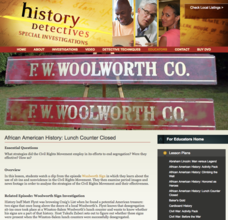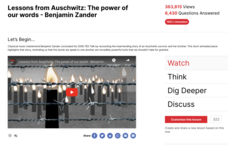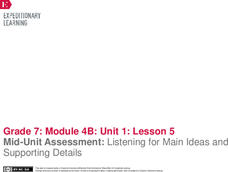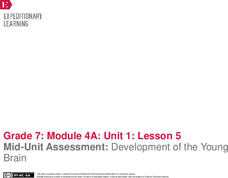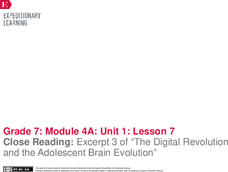The New York Times
Collateral Damage? Researching a Connection Between Video Games and Violence
Hook your class into an exploration of and discussion about violence in video games with a cute animal clip and a video game trailer. After a quick discussion about how media can affect mood, class members read a related article and...
EngageNY
Analyzing the Main Idea in Video: Understanding the Limbic System
It's time to put on those thinking caps and analyze the brain! Pupils watch a video about teenage brain development, using a note-catcher to capture their thoughts about the main idea. Finally, they select two pieces of information from...
EngageNY
Finding Relevant Information and Asking Research Questions: The Benefits of Video Games
Video games may not be so bad after all. As scholars read the text "The Many Benefits, for Kids, of Playing Video Games," they summarize the gist in their researchers' notebooks. Next, pupils draft supporting research questions based on...
EngageNY
Contrasting Evidence: “Games Can Make a Better World” and “Video Games Benefit Children, Study Finds”
Anecdotes, analogies, testimonies, statistics. The most powerful arguments rely on multiple types of evidence. Scholars explore the topic as they read contrasting evidence about the benefits of video games. They complete Venn diagrams to...
PBS
African American History: Lunch Counter Closed
Young historians investigate and evaluate the effectiveness of the strategies the Civil Rights Movement used to end segregation in the United States. After watching an video interview with Carl Matthews and Bill Stevens who participated...
EngageNY
Analyzing Main Ideas and Details: Why Care about Water?
Pay attention to details! After completing text-dependent questions about paragraphs 10-12 of "Water is Life," scholars view the video "Why Care about Water. "They view the video three times and use a Main Idea and Details note-catcher...
TED-Ed
Lessons from Auschwitz: The Power of Our Words
Some words are best left unspoken. Words matter, according to Benjamin Zander, conductor, teacher, and lecturer. To illustrate his point, Zander recounts a story told to him by a survivor of Auschwitz. As a result of her experience this...
PBS
WWII: Detained
Imagine being forced against your will behind barbed wire for doing nothing but being yourself. Scholars investigate the impact Japanese-American internment camps had during World War II. Through video and archival evidence, they create...
Newseum
The Fundamentals of News
A short video introduces middle schoolers to different media-related news terms. Viewers then complete a worksheet and discuss the differences between news and journalism, between facts and opinions.
National Endowment for the Humanities
Galileo: Revealing the Universe
To gain an understanding of the significance of Galileo Galilei's revolutionary ideas, class members watch the short video "Stargazing Before Galileo," and conduct a close reading of Galileo's Sidereal Messsenger. They then compare...
PBS
Women's History: Parading Through History
Want to teach your pupils about debate, effective speech techniques, propaganda, and the women's movement? The first in a sequential series of three, scholars analyze real propaganda images from the the historic women's movement, view a...
Pulitzer Center
The Paradise Papers: A Lesson in Investigative Journalism
The Paradise Papers, a year-long research project from the International Consortium of Investigative Journalism (ICIJ) exposed how political leaders, business people, and wealthy individuals used offshore entities to avoid taxes and hide...
British Council
William Shakespeare
After watching a three-minute video detailing the life of William Shakespeare, scholars take part in several activities designed to show what they know about the famous writer. Learners read a series of eight sentences and put them in...
PBS
Myth of the West: Lonely But Free I’ll Be Found
Tumbling tumbleweeds! Scholars work with video clips, primary and secondary documents, and song lyrics to uncover life in the Old West. They examine song's lyrics to uncover myths told in the 1930s about life in the Wild West.
PBS
March on Washington: A Time for Change
Young historians conclude their study of the events that lead up to and the planning for the March on Washington. After examining videos and primary source documents, they consider the civil rights objectives that still need to be...
EngageNY
Mid-Unit Assessment: Listening for Main Ideas and Supporting Details
Pay attention! Scholars view the video"Why College Students Should Start Paying Attention to Water" multiple times to complete a note catcher. After discussing their thoughts with the class, learners watch "The Water Crisis Isn’t...
PBS
Myth of the West: Kit Carson to the Rescue
There's nothing like the Wild Wild West! Scholars investigate the American Frontier through the eyes of Kit Carson. To complete the first installment of a three-part series, they use presentations, a short video, and primary and...
EngageNY
Paraphrasing and Evaluating Sources: “Gaming Can Make a Better World”
Explore how gaming might make the world a better place. To dissect the statement, scholars watch video clips about the benefits of video games. While listening, pupils make notes in their researcher's notebooks, attempting to discern the...
EngageNY
Mid-Unit Assessment: Development of the Young Brain
Scholars view a video clip about adolescent brain development and work with partners to identify the main idea and supporting details. Next, as part of the mid-unit assessment, pupils watch another clip from the video and complete a main...
EngageNY
Close Reading: Excerpt 3 of “The Digital Revolution and the Adolescent Brain Evolution”
It's time to level up and discover how video games affect the brain. Pupils explore the topic as they continue reading excerpts from an article about adolescent brain development and the digital revolution. Scholars also participate in a...
News Literacy Project
News Goggles: Lionel Ramos, Oklahoma Watch
Given all the recent criticism of the news media and coverage, it's crucial that young people are given the tools they need to evaluate what they see, hear, and read about current events. A video interview from "News Goggles" introduces...
NASA
How Does a Hurricane Form?
Young meteorologists examine the formation of a hurricane in a resource focused on severe weather conditions. Once they learn that a hurricane is also a tropical cyclone, and detail the different levels associated with tropical storms,...
Freeology
Martin Luther King, Jr.'s "I Have a Dream"
Dr. Martin Luther King, Jr.'s speech "I Have A Dream" is hailed as one of the most eloquent and moving speeches of the 20th century. But what makes his words hit his listeners' ears in just the right ways? Young orators study Dr. King's...
PBS
Abraham Lincoln: Man versus Legend
Abraham Lincoln was one of the greatest presidents ever ... right? Scholars research the accomplishments and struggles of the Lincoln presidency. They uncover facts, materials and information via video clips, primary, and secondary...
Other popular searches
- Educational Videos
- Bill Nye Video Questions
- Butterfly Life Cycle Video
- Aztecs Videos
- Video Games
- Digital Video Camera
- Video Production
- Acid Rain Videos
- Conflict Management Videos
- Dental Health Videos
- Home Economics Videos
- Video Cellular Respiration






